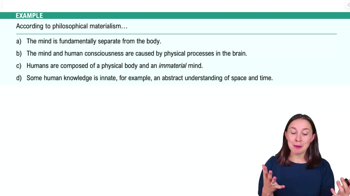Table of contents
- 1. Introduction to Psychology1h 43m
- 2. Psychology Research2h 20m
- 3. Biological Psychology2h 41m
- 4. Sensation and Perception28m
- 5. Consciousness and Sleep32m
- 6. Learning41m
- 7. Memory34m
- 8. Cognition37m
- 9. Emotion and Motivation35m
- 10. Developmental Psychology33m
- 11. Personality48m
- 12. Social Psychology41m
- 13. Stress and Health41m
- 14. Psychological Disorders44m
- 15. Treatment47m
1. Introduction to Psychology
What is Psychology?
Struggling with Psychology?
Join thousands of students who trust us to help them ace their exams!Watch the first videoMultiple Choice
Dr. Lozinski observes that the students in her class who read both the text and visual aid presentations tend to perform better on her exams than the students who only read the text or only view the visual aids. Dr. Mason's observation best depicts which goal of psychology?
A
Description
B
Control
C
Explanation
D
Prediction
 Verified step by step guidance
Verified step by step guidance1
Identify the four primary goals of psychology: Description, Explanation, Prediction, and Control.
Understand that 'Description' involves observing and noting behaviors to provide a clear picture of what is occurring.
Recognize that 'Explanation' seeks to understand the causes of behavior and the reasons why it occurs.
Acknowledge that 'Prediction' involves identifying the likelihood of a behavior occurring in the future based on observed patterns.
Realize that 'Control' refers to modifying behavior from an undesirable one to a desirable one. In this context, Dr. Lozinski's observation is about noting a pattern (students who use both resources perform better), which aligns with the goal of 'Description'.

 1:53m
1:53mWatch next
Master Intro to Psychology with a bite sized video explanation from Hannah Gordils
Start learningRelated Videos
Related Practice
































